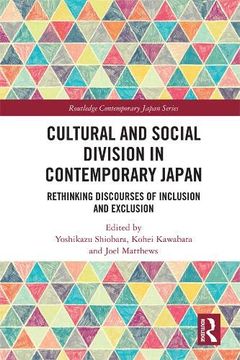Compartir
Cultural and Social Division in Contemporary Japan: Bridging Social Division (Routledge Contemporary Japan Series) (en Inglés)
$ 578.744
$ 890.375
Ahorras: $ 311.631
Elige la lista en la que quieres agregar tu producto o crea una nueva lista
✓ Producto agregado correctamente a la lista de deseos.
Ir a Mis Listas
Origen: Estados Unidos
(Costos de importación incluídos en el precio)
Se enviará desde nuestra bodega entre el
Miércoles 24 de Julio y el
Lunes 05 de Agosto.
Lo recibirás en cualquier lugar de Colombia entre 1 y 5 días hábiles luego del envío.
Reseña del libro "Cultural and Social Division in Contemporary Japan: Bridging Social Division (Routledge Contemporary Japan Series) (en Inglés)"
The recent manifestation of exclusionism in Japan has emerged at a time of intensified neoliberal economic policies, increased cross-border migration brought on by globalization, the elevated threat of global terrorism, heightened tensions between East Asian states over historical and territorial conflicts, and a backlash by Japanese conservatives over perceived historical apologism. The social and political environment for minorities in Japan has shifted drastically since the 1990s, yet many studies of Japan still tend to view Japan through the dominant discourses of “ethnic homogeneity (tanitsu minzoku shakai)” and “middle-class society (so¯churyu¯-shakai)” which positions the exclusion of minorities as an exceptional phenomenon. While exclusionism has been recognized as a serious threat to minority groups, it has not often been considered a representative issue for the whole of Japanese society. This tendency will persist until the discourses of tanitsu minzoku shakai and so¯churyu¯-shakai are systematically debunked and Japan is widely recognized as both multiethnic and socio-economically stratified. Today, as with most advanced capitalist countries, serious social divides occasioned by the impacts of globalization and neoliberalism have destabilized Japanese society. This book explores not only how Japanese society is diversified and unequal, but also how diversity and inequality have caused people to divide into separate realities from which conflict and violence have emerged. It empirically examines the current situation while considering the historical development of exclusionism from the interdisciplinary viewpoints of history, policy studies, cultural studies, sociology and cultural anthropology. In addition to analyzing the realities of division and exclusionism, the authors propose theoretical alternatives to overcome such cultural and social divides.
- 0% (0)
- 0% (0)
- 0% (0)
- 0% (0)
- 0% (0)
Todos los libros de nuestro catálogo son Originales.
El libro está escrito en Inglés.
La encuadernación de esta edición es Tapa Dura.
✓ Producto agregado correctamente al carro, Ir a Pagar.

